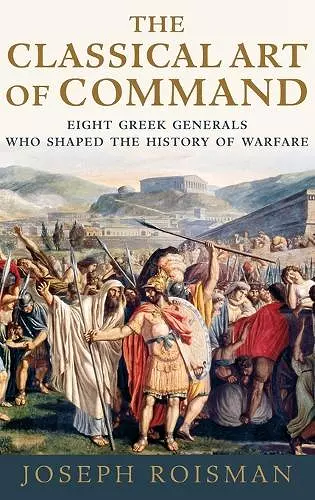The Classical Art of Command
Eight Greek Generals Who Shaped the History of Warfare
Format:Hardback
Publisher:Oxford University Press Inc
Published:30th Mar '17
Currently unavailable, and unfortunately no date known when it will be back
This hardback is available in another edition too:
- Paperback£24.49(9780197607176)

This book explores Greek generalship through the lives of eight influential commanders, revealing their strategic innovations and the impact of their personalities on military history.
In The Classical Art of Command, the author delves into the intricate world of Greek leadership during the Classical Age, focusing on eight remarkable generals who significantly influenced Greek military history. This exploration highlights not only their strategic prowess but also the profound impact of their personalities on their command styles. Each general represents a different facet of leadership, offering readers a comprehensive view of what it meant to lead in ancient Greece.
The narrative introduces iconic figures such as Leonidas, whose valor at Thermopylae embodies the heroic spirit of Sparta, and Themistocles, the visionary behind Athens' naval dominance. The work also examines Pericles, whose leadership during the Peloponnesian War shaped Athenian democracy, and Demosthenes, known for his unconventional tactics. Other key figures include Lysander, who secured victory for Sparta, and Dionysius I of Syracuse, recognized for his innovative military strategies. The book also discusses Epaminondas and Pelopidas, whose collaboration transformed Thebes into a formidable power.
Through detailed analyses of their military campaigns and strategic decisions, The Classical Art of Command reveals the evolving nature of Greek generalship and its adaptability to various challenges. It raises important questions about the roles these leaders played, whether as mere commanders or strategic thinkers, and what qualities rendered them exceptional in the eyes of both ancient and modern historians. This book is an essential read for anyone interested in ancient warfare, offering insights for both novices and experts alike.
This is an important book, accessible to students, scholars, and the lay reader. The writing style is clear and focused, and in each chapter Roisman blends ancient evidence with scholarly perception, reaching compelling and thought-provoking conclusions. This will become a standard work in the study of ancient warfare and military leadership. * Journal of Military History *
The book is written in a flowing, easy style which makes it pleasure to read and accessible to undergraduates, and at the same time it contains insights which are valuable for modern scholarly discussions, some of which have been singled out above. Roisman succeeds in stressing the versatility expected from classical Greek generals and the importance of their personalities for the course of history. * Pavel Nývlt, Institute of Philosophy, Czech Academy of Sciences, Listy Filologické *
[Roisman] is to be especially commended for the clarity, with which he traces the often complex shifts in alliances, particularly in the period after the Peloponnesian War -- a not insignificant detail, since the ability to cement or undermine these alliances was an important weapon in the commander's arsenal. With 38 illustrations and 38 maps, an extensive bibliography and a useful survey of primary sources, this is a welcome addition to the library of anyone interested in the ancient Greek world. * David Stuttard, Classics For All *
Overall, the material in this work is informed, well-presented, and supported by outstanding, careful research. This is an excellent contribution to this area of scholarship, and does a wonderful job of demonstrating the complexities of this type of leadership role, the planning and management of ancient warfare, and sheds new light on a number of well-known and important battles during this age. The general reader, as well as students and scholars, will find this work interesting and insightful. The Classical Art of Command will be a fundamental work for research into various aspects of Greek warfare and ancient Greek command during the Classical Age, as well as the lives and careers of these famous generals. * Charlotte Dunn, Ancient HIstory Bulletin *
ISBN: 9780199985821
Dimensions: 218mm x 135mm x 33mm
Weight: 499g
416 pages